《新编国际商务英语函电(第三版)》课件PPT:Lesson12
- 格式:ppt
- 大小:3.55 MB
- 文档页数:16
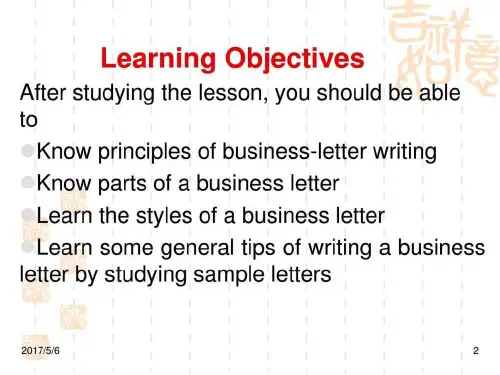
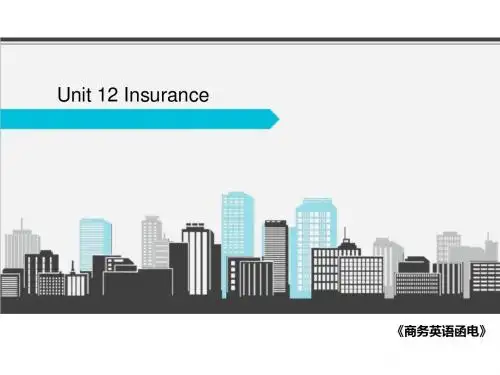
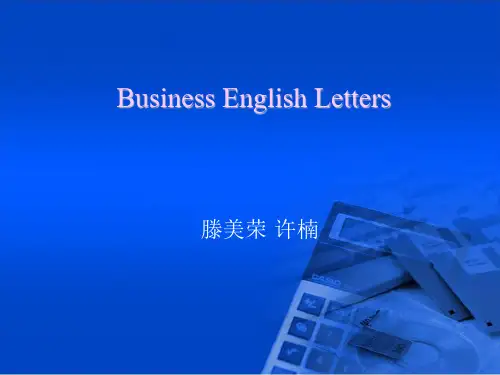
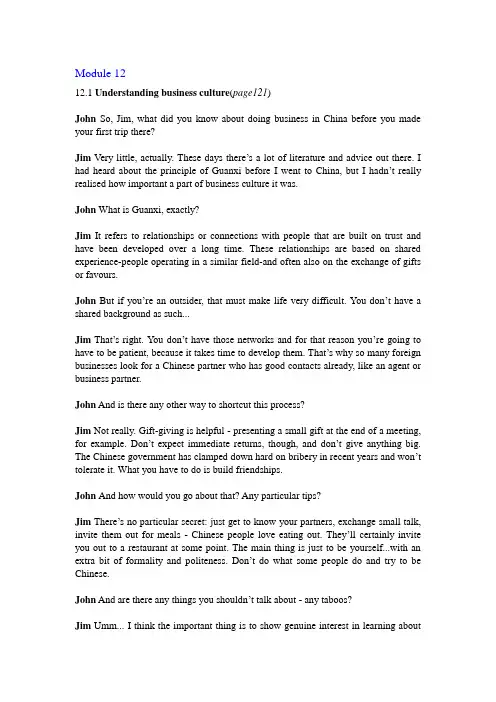
Module 1212.1 Understanding business culture(page121)John So, Jim, what did you know about doing business in China before you made your first trip there?Jim Very little, actually. These days there’s a lot of literature and advice out there. I had heard about the principle of Guanxi before I went to China, but I hadn’t really realised how important a part of business culture it was.John What is Guanxi, exactly?Jim It refers to relationships or connections with people that are built on trust and have been developed over a long time. These relationships are based on shared experience-people operating in a similar field-and often also on the exchange of gifts or favours.John But if you’re an outsider, that must make life very difficult. You don’t have a shared background as such...Jim That’s right. You don’t have those networks and for that reason you’re going to have to be patient, because it takes time to develop them. That’s why so many foreign businesses look for a Chinese partner who has good contacts already, like an agent or business partner.John And is there any other way to shortcut this process?Jim Not really. Gift-giving is helpful - presenting a small gift at the end of a meeting, for example. Don’t expect immediate returns, though, and don’t give anything big. The Chinese government has clamped down hard on bribery in recent years and won’t tolerate it. What you have to do is build friendships.John And how would you go about that? Any particular tips?Jim There’s no particular secret: just get to know your partners, exchange small talk, invite them out for meals - Chinese people love eating out. They’ll certainly invite you out to a restaurant at some point. The main thing is just to be yourself...with an extra bit of formality and politeness. Don’t do what some people do and try to be Chinese.John And are there any things you shouldn’t talk about - any taboos?Jim Umm... I think the important thing is to show genuine interest in learning aboutChina and its customs, and to be respectful of the country and the government. There are also a few different habits. Sometime during the meal there will be toasts - make sure that you make one to the most senior member of the group there.John Any other tips?Jim well, they appreciate the best - established brands with a quality reputation - having had limited access to western products in the past. Everyday practicalities? Er... People dress soberly for business, they shake hands on ually, though occasionally they’ll just nod at you. They love to exchange business cards, so bring lots of those. And when you receive one make sure you study it carefully - it’s very rude just to put it straight in your pocket.John What about their behaviour? The Chinese have a reputation for being difficult to read.Jim I don’t really find that. Perhaps they use facial expressions or gestures less freely than westerners do. They do seem to take their time agreeing to things. There are two reasons for that: first of all, they generally operate within big hierarchies and the decision may need to come from high up; secondly, they dislike saying ‘no’ directly. If they start to make a series of small objections to something, it generally means they’re trying to say they’re not interested. But above all, as i said before, don’t worry about the time all this takes - you’re going to need that anyway to learn how Chinese companies operate and all the governance and tax laws, the regulations around joint ventures and so on...12.2 Small talk: short responses(page122)Sarah Hi, Joachim, sorry to be a little late.Joachim No problem. Good to see you again. How was your trip?Sarah It was fine. No delays , just the usual traffic from the airport.Joachim And did you find our offices easily?Sarah Yes, thank you. Your directions were very clear.Joachim OK. So, can I get you a coffee before we start?Sarah Yes. I’d love one. White, one sugar, please.Joachim And, how are you fixed for time?Sarah I’ve got a couple of hours now. I hope that’s enough.Joachim Sorry, do you mind if I just take this call?Sarah No, of course not. Go ahead...Joachim Sorry about that - the boss. So, are you expecting it to be a good year? Sarah Well, I hope so. Last year was pretty flat, as you know.Joachim Well, that’s really what I’d like to talk about today - how we can ramp things up a bit. Can I be of any help with the marketing side of things?Sarah That’s kind of you, but we should be able to cope. It’s just a question of programming it in. We’re planning a campaign meeting next week...Joachim ...so I think that’s been a useful start to our discussions. I will programme another meeting for two weeks’ time. But I think you have to go now. Would you like to go for a meal this evening?Sarah I’d love to, but I’m afraid I have to be back in London by six.Joachim No worries. Would you like a lift back to the station?Sarah That would be really nice, but I don’t want to put you out.Joachim It’s no problem. I’m going that way anyway.。

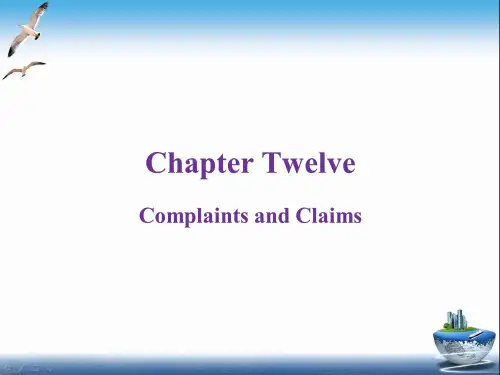
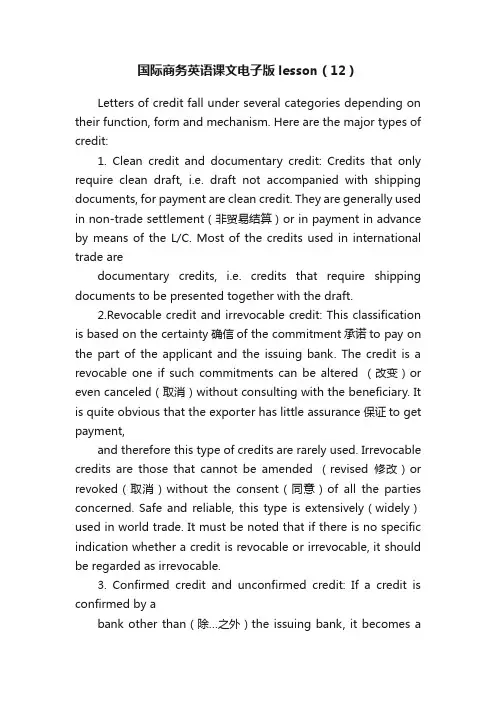
国际商务英语课文电子版lesson(12)Letters of credit fall under several categories depending on their function, form and mechanism. Here are the major types of credit:1. Clean credit and documentary credit: Credits that only require clean draft, i.e. draft not accompanied with shipping documents, for payment are clean credit. They are generally used in non-trade settlement(非贸易结算)or in payment in advance by means of the L/C. Most of the credits used in international trade aredocumentary credits, i.e. credits that require shipping documents to be presented together with the draft.2.Revocable credit and irrevocable credit: This classification is based on the certainty确信of the commitment承诺to pay on the part of the applicant and the issuing bank. The credit is a revocable one if such commitments can be altered (改变)or even canceled(取消)without consulting with the beneficiary. It is quite obvious that the exporter has little assurance保证to get payment,and therefore this type of credits are rarely used. Irrevocable credits are those that cannot be amended (revised修改)or revoked(取消)without the consent(同意)of all the parties concerned. Safe and reliable, this type is extensively(widely)used in world trade. It must be noted that if there is no specific indication whether a credit is revocable or irrevocable, it should be regarded as irrevocable.3. Confirmed credit and unconfirmed credit: If a credit is confirmed by abank other than(除…之外)the issuing bank, it becomes aconfirmed credit. The confirmation is undertaken 承担either by the advising bank or by another leading bank. Under a confirmed credit, the beneficiary is given double assurance of payment 双重付款担保since the confirming bank has added its own undertaking承诺to that承担of the opening bank. If the credit is not confirmed by another bank, it is an unconfirmed letter of credit. Though a confirmed credit isconsidered to be able to provide the greatest degree of security to the beneficiary, it involves additional cost as a result of the confirmation. Therefore if the establishing bank is a reliable prime bank, confirmation may not be necessary.4. Sight credit and usance credit: A sight credit is one by which payment can be made upon presentation of the draft and impeccable documents by the beneficiary to the bank. It gives the beneficiary better security and helps him speed up his capital turnover. 资金周转Most of China’s export contracts stipulate for sight credit in payment terms. Obviously, a sight credit calls for a sight draft.It is also clear that this type of credit requires a usance draft. If the beneficiary wishes to get payment before the maturity到期of the draft, he can ask the bank to discount贴现the acceptance, and immediately pay him the net proceeds净收益(net position 实际头寸), i. e. the face value 面值of the draft minus 减去the discount charges收费.5. Transferable credit and non-transferable credit: If a credit can be transferred by the original beneficiary to one or more parties, it is a transferable credit. The original beneficiary is called the first beneficiary and the party (or parties) the credit is transferred to is called the second beneficiary. It is usually used when the first beneficiary is a middleman and does not supplythegoods himself. A credit can be transferred only once. But transferring a credit to more than one party at the same time is allowed provided partial shipments are permitted. If a credit does not specify whether it is transferable, it should be regarded as a non-transferable document according to the credit stipulation.6. Non-draft credit: There is a modern tendency for payment to be made by presentation of the documents without the formality ofdrawing and presenting a draft. Such credits are non-draft credit. They mainly include payment credit and deferred payment credit which are respectively similar to sight credit and usance credit with the difference that no draft is drawn and presented in the case of non-draft credit.7. Revolving credit: If a credit stipulated that its amount can be renewed更新or reinstated恢复without specific amendment to the credit being made, it is then a revolving credit. It is particularlyuseful when the buyer and seller have regular trading relationship and deal in a specific quantity of goods each month or any particular period of time.It has already been mentioned that the letter of credit has greatly facilitated便利and promoted international trade. However, like any other methods (mode) of payment, it is not perfect. It cannot provide absolute security for the contracting parties. The seller may sustain losses 蒙受because of the buyer’s delay even failure in the establishment of credit开立信用证. The buyer may suffer losses as a result of the documents presented by the seller which do not truly represent the goods shipped. And it is not absolutely avoidable that thebank may become insolvent破产的or bankrupt. Besides, it is more expensive to use the letter of credit than remittance or collection as the bank will charge 收费its client for all the services it provides. So the letter of credit may not be the most ideal(best)method of payment for a particular transaction, and the contracting parties should make their best choice according to the specific conditions.。

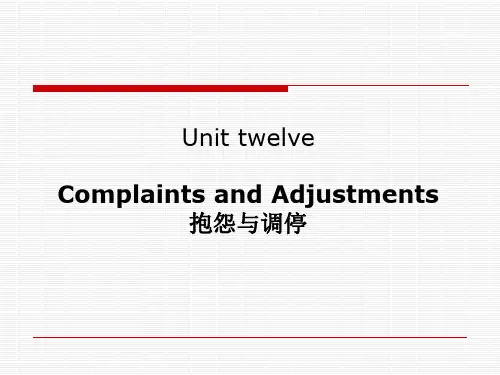
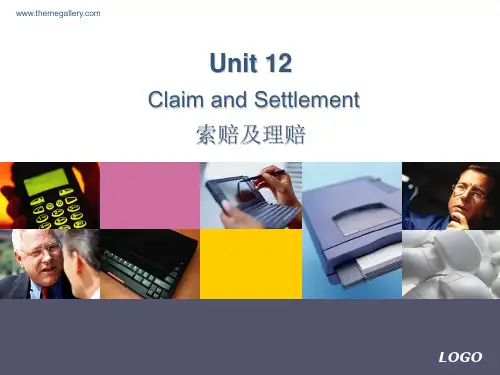
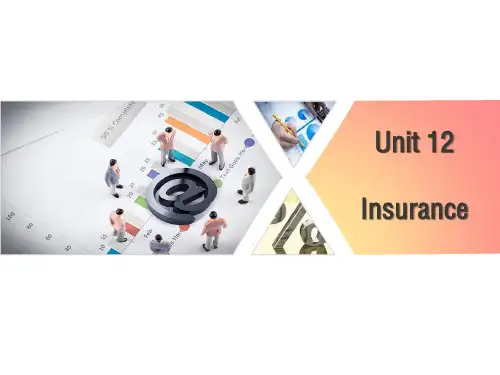
可编辑修改精选全文完整版12.1 Crossing culturesVOCABULARYGlobalisation1Why do you think kofi Annan said this?‘…arguing against globalization is like arguing against the laws of gravity.’Kofi Annan, United Nations3What does the term globalization mean to you?4Mark the following aspects of globalization positive (+), negative (-) or don’t know (?).Compare and discuss with your partner.1 free trade (abolition of trade barriers)2 opening of markets3 social integration and merging of cultures (the global village)4 increased competition in the world market5 free movement of labour (migration of workers)6 free movement of capital7 development of advanced communications8 reduction in the cost of goods9 growing influence of multinational corporations5Which of these effects can you see particularly in your country?READINGCross-culture communication6Why is culture important to business people? Discuss with a partner.7 Read this opening passage from a book by Neil Bromford on cross-cultural communication. Choose the best‘blurb’to go on the back of the book.8 Think of a title for Neil Bromford’s book.9Look at these words (1-8) from the text above and find a synonym (A-I) for each.0 feature A unusual1 uncommon B aspect2 awareness C strange3 to lose face D knowledge4 to chat E to feel humiliated5 pressed for time F to weaken6 influence G to make conversation7 unfamiliar H in a hurryREADING1Make a list of three dos and three don’ts for people who have to do business in a different culture.2Dr A J Schuler gives advice on improving cross-cultural communication in organization. Read the text and choose the best word (A, B, C or D) to fill each gap.UNDERSTANDING CULTURAL DIFFERENCESDirect experienceThe best way to learn about another culture is to be thrown in at the deep end. In other words, get (0) _______ experience. Try to listen to the radio or watch TV programmes from that country or go to special clubs for that specific nationality or group-discussion groups, religious groups, dance groups, etc. In any kind of contact (1) ________ the time to listen and to learn.Don’t be afraid of differenceEven if others’behaviour seems strange of foreign, remember that differences are less (2) ________ than the things we all have in common. We are all made of the same DNA, and as human beings, we share many of the same (3)_______ and basic interests. Enjoy the things we share and at the same time, try to ‘enjoy’the differences.Understand your own cultureBy thinking about your own cultural behaviour and habits, you will open your mind(4)________the behaviour of others. Also this will help you-when you are interpreting the behaviour of an unfamiliar culture-to avoid applying your own cultural (5)________ .Avoid stereotypesWe find stereotypes useful because they help us to order our world and to categorise the different people and experiences in it. They also help to (6)_______ us when we feel uncertain. On the whole though, stereotypes are very superficial and don’t take account of individual differences. Also, because they can be defensive and made to protect us from uncertainty, they often (7)_______ negative wiews of a different culture.We live in a changing worldCultres change through time, and these days, in the ‘global village’ that we live in, this process is happening more rapidly. Don’t(8)________ the effect that your interaction with another culture will have on that culture. As you try to understand them and move(9)________ them, so they will do the same and the cultre that you thought you were dealing with will have changed.Think also about how your own cultural values are being received or accommodated by your foreign (10)_____as you both try to bridge the gap.0 A unique B fist-hand C original D personnel1 A take B have C spend D pass2 A many B numerous C ample D amount3 A motors B motivators C motivations D motifs4 A up B for C of D to5 A standards B mentality C figures D thought6 A assure B ensure C insure D reassure7 A make B promote C mean D reassure8 A undergo B underprice C underestimate D understand9 A to B across C close D towards10 A opposite B counterpart C relation D workmate GRAMMARGrammar TipAll the verb forms in exercise 3 are used to speculate about the past; in other words to wonder how things might have been different from what thy actually were. Speculation3What is implied about what actually happened in each of these cases?0 If I had listened to your advice, I would never have taken the rain.I took the train and it was a disaster.1 I would be a millionaire by now if I had taken up her offer.2 If I were braver, I would have told him what I thought.3 I shouldn’t have been so hasty in my judgment of her.4 I wish we had been taught to speak languages better at school.5 Without influential political connections, he wouldn’t have got so far.6 He should have thought before he spoke.7 She could have been anything she wanted to be, if she had put her mind to it.8 In hindsight, it might have been more polite to arrive a little early.4Complete the following sentences0 I’m glad she spoke good English. It could have been (could/ be) difficult otherwise.1 If I had known I was going to have to pay for myself, I _________(never/accept) their invitation.2 No-one would have heard me say I was leaving if he _________(not/put) the call on speaker phone.3 I know you didn’t want to go to their party, but you________(should/reply) to the invitation.4 Never eat raw vegetables-they__________(might/wash) in unclean water.5 You__________(should/not/take) a gift. No-one else did and I think the hosts were embarrassed.6 I really wanted to meet Anna- I wish you____________(introduce) me.5Study the following culturally sensitive situations. What is the best way to handle each situation?1 Serge prided himself on his adventurousness with food. Until, that is, Mr Sato, the company’s main Japanese supplier, invited him out to dinner and ordered them each a dish consisting of a small charred bird. As Serge hesitated Mr Sato proceeded to eat his bird whole, head and all.2 Tina was pressed for time. She was at the Milan trade fair only for one day with too many people to see and too many things to do. Her heart sank as she saw Umberto Ginelli approaching. Signor Ginelli was one of her best customers but always seemed to have all the time in the world to chat.3 Frank was known for telling jokes in poor taste and Stefan was dreading spending another evening with him, especially with his boss there, as he was easily offended. Then Frank began,‘Did you hear the one about the Irishman and the American tourist?’4 Maison Blanc was a very expensive restaurant and Sarah had always wanted to go there. But now she was there, she couldn’t relax. Malcolm had invited everyone in the team to celebrate his promotion, but it wasn’t really clear whether he was going to pay or each person had to pay for themselves.6 Have you had any similar experiences? Describe them to your partner. Ask what they would have done in the same situation.READING1 Work with your partner to answer the following quiz taken from the in-flight2 Compare your answers with the ones given. How did you do ? Are you surprised?LISTENINGUnderstanding business culture3 12.1 You will hear an extract from the radio series The real world of business. In this programme an American electronics entrepreneur talks about his experience of doing business in China. Listen and mark one letter(A, B or C) for the correct answer.1 Jim hadn’t realized that Guanxi wasA so vital in business.B so common in Chinese culture.C such a complicated principle.2 He defines Guanxi asA building a support network of collaborators in business.B the exchange of presents between collaborators.C the experience you gain from doing business over a long time.3 A lot of foreign companiesA use Chinese interpretersB fail because they don’t understand Guanxi.C try to form partnerships with Chinese business people.4 The Chinese government’s policy on bribery isA quite relaxed.B much stricter than it used to be.C to ignore it.5 You should show an interest inA the most important person in the group.B Chinese food.C Chinese culture and society.6 When you receive a business card you shouldA read it properly before putting it away.B not put it in your pocket.C give yours at the same time.7 One reason it takes time to get an agreement isA the Chinese don’t like to commit themselves.B there are often many levels of management to go through.C they will want to solve all the small problems first.8 The most important thing isA to be patient.B to understand the tax lawsC to learn some Chinese.WRITINGA market profile report4 Following a recent business trip to China to investigate the possibilities of importing teas, your manager has asked you to write a report on the particularities of doing business over there. Write the report, including the following points:●the aims of your visit.●How your meetings with tea manufacturers went.●The reaction of your potential business partners to your proposals.●Advice and recommendations for other colleagues who follow up this visit.。